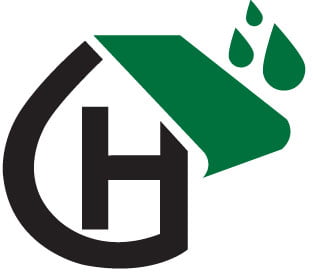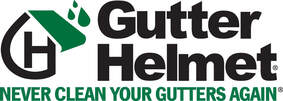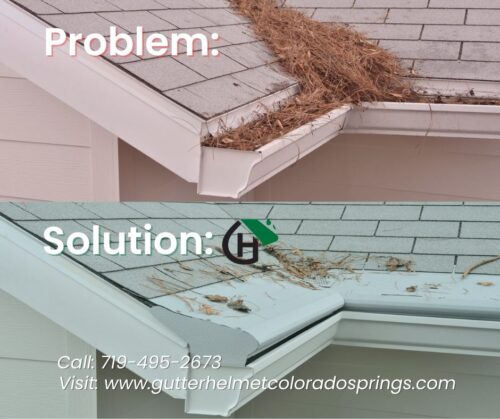Many homeowners struggle with keeping their gutters clean. Here we provide comparison information and valuable insights on the various gutter guard systems available. Particularly in Colorado Springs with the pine trees constantly dropping their pine needles, the aspens and cottonwoods dropping their leaves, this is a real problem that can cause water damage if not managed properly. Clogged gutters and downspouts can create an even bigger problem in the spring with our freeze-thaw cycles and a gutter that can’t move water the way it is supposed to.
We will provide a brief description and pros & cons to give you a comprehensive understanding and help you decide which gutter guards work best. Let’s dive in and explore the world of gutter guard protection systems!
Screen Gutter Guards
Screen gutter guards are a popular type of gutter guard that feature large holes to keep out leaves and other large debris. They are easy to install and offer some level of protection against gutter clogging. However, they may not effectively block finer debris such as pine needles or shingle granules. If your property has pine trees, or your shingles are regularly hit by hail, screen gutter guards are generally not the best long-term option. With the lowest material cost, this type of product generally does not stand the test of time.
Pros and cons of screen gutter guards
Pros:
- Affordable: Screen gutter guards are usually less expensive than other types of gutter guards. This makes them an attractive option for homeowners looking to protect their gutters on a budget.
- Easy to Install: Most screen guards can be installed easily and quickly. Some are designed for DIY installation, which can save on labor costs.
- Effective Against Larger Debris: Screen guards can be effective at keeping out larger debris, such as leaves and twigs.
- Variety of Materials: Screen gutter guards are available in a variety of materials, including plastic, metal, and vinyl, giving homeowners several options to choose from.
Cons:
- Smaller Debris: While they may be decent at keeping out larger debris, smaller particles like pine needles, seeds, and shingle granules can still get through the screen and into the gutter, potentially causing clogs.
- Durability: Screen gutter guards, especially those made from cheaper materials, may not be as durable as other types of gutter guards. Over time, they can become damaged by weather, heavy debris, or animals.
- Maintenance: Screen gutter guards generally need to be cleaned occasionally as small debris can get stuck in the screen holes. Also, in areas with heavy leaf fall, the screens can become clogged and may need to be brushed off. This defeats the purpose of investing time and money into a gutter protection system.
- Water Overflow: In heavy rain, water can sometimes flow over the top of screen gutter guards, rather than through the screen and into the gutter. This can be worse if debris gets stuck on the screen, and may actually contribute to water damage.
- Fit and Compatibility: Not all screen gutter guards will fit all types of gutters, and improper fit can affect performance. Some may need to be professionally installed to ensure a proper fit.
Mesh Gutter Guards
Mesh gutter guards are gutter protection systems that feature small holes or openings that allow water to flow through while keeping debris out. The mesh is typically made of stainless steel or plastic and is installed over the top of the gutters, acting as a barrier against leaves, twigs, and other debris.
Pros and cons of mesh gutter guards
Pros:
Mesh gutter guards effectively block larger debris from entering the gutters, preventing clogs and allowing water to flow freely.
They are relatively easy to install and can be fitted to both existing gutters and new gutter systems.
Mesh guards are less visible from the ground, preserving the aesthetic appeal of your home.
They are compatible with various roof types and gutter materials.
- Mesh gutter guards are low-maintenance and require minimal cleaning.
Cons:
Fine debris, such as pine needles and small seeds, may still find their way through the mesh openings and accumulate on top of the guards, requiring occasional cleaning.
Mesh guards may become clogged over time with small debris, reducing their effectiveness and necessitating periodic maintenance.
Depending on the quality of the mesh material, it may deteriorate and become less durable over time.
In areas with heavy rainfall, water may overflow the mesh openings, potentially causing water damage to the fascia or foundation.
Mesh gutter guards are a popular choice for homeowners looking for an effective and visually appealing gutter protection system. Before installing mesh gutter guards, consider factors such as the size of debris in your area, the specific mesh design, and the climate conditions to ensure the best performance and longevity of the guards.
Solid Aluminum Shields
Solid Aluminum Shield Gutter Guards are a unique gutter guard solution. This design is also known as Reverse-curve Gutter Guards and Surface-Tension Gutter Guards. These are a type of gutter protection system that allows water to move along the top of the guard and then slip into the gutters while preventing debris from accumulating in the gutter. The Gutter Helmet product is a reverse-curve gutter guard system employing the patented Nose-Forward Design with a 1” overhang to launch leaves and pine needles to the ground while carrying the water back into the gutter..
Pros and Cons of Reverse-Curve Gutter Guards
Here are some pros and cons of using reverse-curve gutter guards:
Pros:
-
Allow water to flow smoothly into the gutters while keeping debris out
-
Prevents warping and sagging of the gutters
-
Long-lasting and low-maintenance solution
-
Can handle heavy rainfalls effectively
Cons:
-
Installation can be more expensive compared to other gutter guard options
It is important to consider the specific needs and requirements of your home before choosing a gutter guard system. To learn more about how a reverse-curve gutter protection system works, click here.
Brush Gutter Guards
Brush gutter guards are a type of gutter protection system that consists of cylindrical brushes made from durable materials such as polypropylene. These brushes are designed to fill the gutter space, preventing leaves, debris, and other types of blockage from entering the gutter while allowing water to flow freely. The bristles of the brushes can be easily maneuvered to fit different gutter sizes and can be trimmed to the desired length for proper installation.
Pros and cons of brush gutter guards
Here are the pros and cons of using brush gutter guards:
Pros:
Easy installation: Brush gutter guards can be easily installed by homeowners without the need for professional assistance.
Durability: These guards are made from sturdy materials that can withstand harsh weather conditions and resist corrosion.
Adequate water flow: The bristles of the brushes allow water to flow freely through the gutters, preventing overflow and potential damage to the foundation.
Versatility: Brush gutter guards can be used in different types of gutters and can be custom-fitted to suit specific gutter sizes.
Cons:
Debris accumulation: While brush gutter guards are effective at blocking leaves and large debris, smaller particles may still accumulate in between the bristles and require occasional maintenance.
Potential for mold growth: The accumulation of organic matter within the bristles can create a conducive environment for mold and mildew growth if not cleaned regularly.
Brush replacement: Over time, the bristles of the brush gutter guards may wear out and require replacement to maintain their effectiveness.
Overall, brush gutter guards offer a simple and cost-effective solution to keeping your gutters free from clogs. However, it’s essential to consider the specific requirements of your gutter system and the amount of debris in your area before choosing this type of gutter protection.
Foam Gutter Guards
Foam gutter guards are a type of gutter protection system that is designed to fit inside the gutter. They are made from a porous foam material that allows water to flow through while preventing leaves and debris from entering the gutter. Foam gutter guards are easy to install and can be cut to fit any size gutter.
Pros and cons of foam gutter guards
Pros:
-
Easy to install
-
Affordable
-
Can be cut to fit any size gutter
-
Allows water to flow freely
-
Prevents leaves and debris from entering the gutter
Cons:
-
Less durable than other types of gutter guards
-
May need to be replaced more frequently
-
Can become clogged with small debris over time, which defeats the purpose
Foam gutter guards are a popular choice for homeowners looking for an inexpensive and easy-to-install gutter protection solution. However, they may not be as durable as other types of gutter guards and may require more frequent maintenance.
Comparison of Gutter Guard Types
Key factors to consider when choosing a gutter guard
When choosing a gutter guard, there are several key factors to consider:
- Type of debris: Consider the type of debris common in your area, such as leaves, pine needles, or small debris.
- Gutter size: Measure the width and depth of your gutters to ensure a proper fit.
- Material: Look for durable materials like stainless steel or aluminum.
- Installation method: Decide if you prefer a DIY installation or professional installation.
Comparison of effectiveness and pricing of different types
Here is a comparison of the effectiveness of different types of gutter guards:
|
Gutter Guard Type |
Effectiveness Against Debris |
Ease of Installation |
|
Screen Guards |
Fair |
Easy |
|
Mesh Guards |
Good |
Moderate |
|
Micro-Mesh Guards |
Excellent |
Professional |
|
Solid Aluminum Shields |
Excellent |
Professional |
|
Brush Guards |
Fair |
Easy |
|
Foam Guards |
Fair |
Easy |
Keep in mind that the effectiveness of each gutter guard type can vary depending on various factors, such as the amount and type of debris in your area. Mesh and screen gutter guards generally struggle with pine needles. It’s important to choose a gutter guard that suits your specific needs and budget.
Best Gutter Guards
When it comes to choosing the best gutter guard for your needs, it’s important to consider factors such as the type of guard, the material it’s made of, will it fit your gutters, and whether you want to install it yourself or hire a professional. Additionally, take into account the size and style of your gutters, as well as your budget and aesthetic preferences.
Final tips and recommendations
-
Conduct thorough research and read customer reviews before making a decision.
-
Consider the warranty offered by the manufacturer or installer.
-
Seek professional advice if you’re unsure about the installation process.
-
Remember that proper maintenance is key to ensuring your gutters remain effective and clog-free.
In Colorado Springs, we believe the Gutter Helmet System offers the most advanced design, durable materials, and warranty assurance of any other type of gutter guard system on the market. The patented nose-forward design is unique in the industry and provides the top-performing gutter protection for your home. This system does the best job at preventing leaves and pine needles from clogging up gutters and allowing water to flow freely into the gutters and reach the downspout unobstructed.
By taking these considerations into account, you can confidently choose the best gutter guard that will protect your home and save you time and effort in the long run. Contact Gutter Helmet of the Pikes Peak region to schedule your consultation today.











